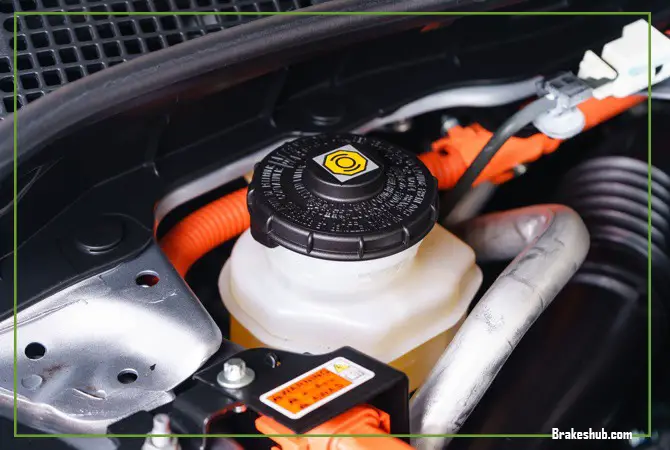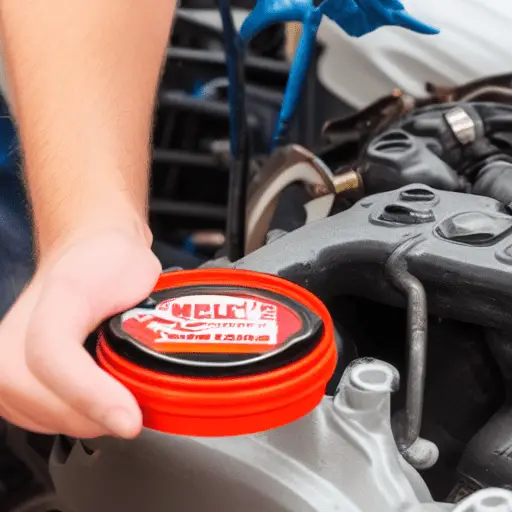Why Is Brake Fluid Corrosive, And How Does It Affect Your Car?
Brake fluid is corrosive and can damage your car if it leaks. The brake system is sealed so that the fluid does not come into contact with the car’s metal parts. However, the fluid can eat away the metal if the system leaks, causing expensive damage. If you think your brake system is leaking, a mechanic must check it out immediately.
I know, I know. You’re thinking, “Why do I care? My car brakes just fine.” But trust me, you want to know why brake fluid is corrosive and how it affects your car. Especially if you own an old clunker that’s been kicking around for a while, keep reading to find out!
Table of Contents
Why Is Brake Fluid Corrosive?
Brake fluid is corrosive due to its chemical composition and role in the braking system. Brake fluid is typically a glycol-based hydraulic fluid designed to transmit pressure within the brake system, allowing for the effective operation of the brakes. It is formulated to have specific properties such as high boiling points and low compressibility.
One of the reasons brake fluid is corrosive is that it is hygroscopic, meaning it can absorb moisture from the surrounding environment. Moisture can enter the brake system through various means, such as small openings or from the atmosphere during brake fluid replacement. When moisture combines with brake fluid, it can lead to a chemical reaction that causes corrosion.
Corrosion occurs as the moisture in the brake fluid reacts with the metal components of the braking system, such as brake lines, calipers, and master cylinders. This reaction can result in the formation of rust, pitting, and degradation of the metal surfaces. Corrosion compromises the structural integrity of the components, leading to potential leaks, decreased performance, and, ultimately, brake system failure.
Additionally, brake fluid contains additives and inhibitors that help protect against corrosion. However, over time, these additives can break down and become less effective, making the brake fluid more prone to causing corrosion.
To mitigate the corrosive effects of brake fluid, it is important to perform regular brake fluid flushes and replacements as the vehicle manufacturer recommends. This helps remove any moisture and contaminants from the system, reducing the risk of corrosion. Using the proper type of brake fluid specified by the manufacturer and maintaining a sealed brake system also prevent corrosion and ensure optimal brake performance.
How does brake fluid affect the other parts when it is leaking?

The brake fluid is corrosive, which means it eats away at the metals in your car. When this happens, it causes rust inside your wheels and rotors. This will eventually cause them to fail.
It also eats away the rubber in your tires, making them wear down faster than they should. This could lead to an accident or even a crash. Brake fluid is corrosive because it contains water. When the water in the brake fluid evaporates, it leaves behind a salt deposit. This salt can corrode the metal parts of your car’s braking system.
You should have your brake fluid flushed and replaced every two years to prevent this. Also, do you know? What is brake fluid made of?
What are the consequences of brake fluid being corrosive?
If your brakes leak, several things can happen. First, the brake pads can get worn down too quickly, making stopping suddenly difficult. Second, the brake lines can become corroded, which makes braking more difficult.
Third, the brake fluid can leak onto the road, which can cause problems for drivers who don’t see it until it’s too late. Finally, if the brake fluid gets into the engine, it can cause serious damage.
How does brake fluid affect your car’s braking system?
When brake fluid leaks, it can ruin your car’s braking system. Driving is dangerous if the brake fluid leaks onto the road because people won’t know what’s happening behind their cars. Even worse, if the brake fluid leaks into the engine, it could cause major problems.
For example, if the brake fluid mixes with oil, it could cause the engine to seize up. In addition, if the brake fluid enters the transmission, it could destroy the gears. Finally, if the fluid leaks into the exhaust pipe, it could cause the car to catch fire.
Why is it important to change your brake fluid regularly?

It’s no joke: brake fluid is important stuff. While most people know it’s important to change their motor oil regularly, far fewer know that changing your brake fluid’s just as important.
Here’s why: brake fluid is designed to withstand high temperatures, so it doesn’t break down like other fluids in your car. However, over time, it can become contaminated with water and air, reducing its effectiveness.
That’s why changing your brake fluid every two years or so is important. Not only will this help keep your brakes working properly, but it will also help extend your brakes’ life. So don’t wait: change your brake fluid today.
What are the signs that your brake fluid needs to be changed?
Many signs indicate that your brake fluid might need to be replaced. One way is if it has leaked onto the ground. Another way is if the color changes. If the brake fluid looks dirty or rusty, it must be changed.
Also, the brake fluid must be replaced if the brake pedal feels spongy or squishy. Finally, if the brakes feel like they aren’t working properly, then it’s likely the brake fluid needs to change.
How do you check your brake fluid level?
The easiest way to check your brake fluid level is by looking at the dipstick on your vehicle. The dipstick is located near the bottom of the reservoir. It usually measures between 1/4″ and 1/2″. To find out how full your brake fluid is, look where the dipstick meets the reservoir.
If the dipstick touches the bottom of the reservoir, then the brake fluid is full. If the dipstick touches the top of the reservoir, then there’s no brake fluid.
You can measure the brake fluid if you don’t have a dipstick. Simply remove the cap from the reservoir and place a measuring cup under the reservoir. Then, fill the cup until it reaches the same height as the reservoir. Once you’ve measured the fluid, add more if necessary.
How often should I change my brake fluid?
It is important to change your brake fluid every year because it breaks down over time. This means that it could leak into the engine and cause damage. In addition, brake fluid is made from petroleum products, so it can break down when exposed to heat and light. Therefore, if you frequently drive your car, you must change your fluid every year.
You should also check the fluid levels periodically to ensure no leakage. If you notice any leaks, you’ll want to fix them immediately.
What are some common myths about brake fluid?
Myth #1: Brake fluid isn’t needed
Brake fluid is very important. Without it, your brakes wouldn’t work. Even though you may never actually use your brakes, brake fluid is still needed. You can tell if you need new brake fluid because your brake pedal will feel soft or spongy. If this happens, you’ll know that your brake fluid needs changing.
Myth #2: Your brake fluid won’t get hot enough to be dangerous
Brake fluid gets extremely hot during braking. When brake fluid heats up, it expands. This causes air pockets inside the system. These air pockets can burst and release carbon dioxide gas. Carbon dioxide gas is flammable, which makes it dangerous. Therefore, you shouldn’t leave your car unattended with the brake pedal depressed for long periods.
Myth #3: There’s nothing wrong with your brake fluid
You might think everything is fine if you drive around with an empty brake fluid reservoir. But your brake fluid could be leaking. Leaking brake fluid can lead to serious problems like brake failure. So, you should replace your brake fluid even if there are no signs of leakage.
Frequently Asked Questions [FAQs]
1. What Does Brake Fluid Do For Your Car?
Brake fluid is a hydraulic fluid used in a car’s braking system. The brake fluid helps to transmit pressure from the brake pedal to the calipers and drum brakes to stop your car. It also helps to cool down and clean up the brake system components to work better.
2. Does Brake Fluid Need To Be Replaced?
The brake fluid needs to be replaced when it is contaminated with water or when the fluid level falls below the minimum level. The brake fluid should be changed every 2-3 years, depending on the type of brakes used in the vehicle.
3. What Are The Primary Components Of Brake Fluid?
Brake fluid is a type of hydraulic brake fluid mainly used in hydraulic braking systems to provide the necessary friction for slowing and stopping a vehicle. The primary brake fluid components are water, glycols (or glycol ethers), dyes, and corrosion inhibitors.
4. Why Is Brake Fluid Corrosive?
Brake fluid is corrosive because it contains hydrochloric acid. The hydrochloric acid in the brake fluid helps dissolve any rust or other particles in the brake system. This prevents those particles from causing damage to the braking system and causing a leak.
5. How Can You Tell If Your Car Has Been Affected By Brake Fluid Corrosion?
A few signs may indicate whether or not your car has been affected by brake fluid corrosion. One of these signs is if your car’s brakes are not as responsive as they used to be or if you notice any leak from the area around your brakes. If you experience these problems, taking your car to the nearest mechanic for inspection is best.
CONCLUSION
Brake fluid is corrosive and can affect your car in several ways. It can damage the paint on your car, cause rust and corrosion, and cause problems with your car’s braking system. If you think your car has a problem with its brake fluid, take it to a mechanic or dealer for inspection.
